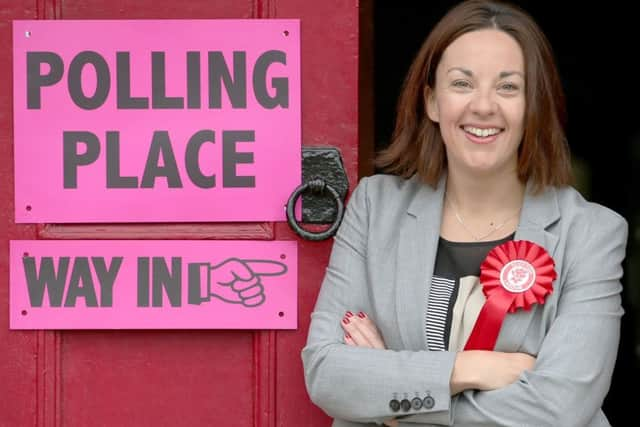Darren McGarvey: SNP lost support, not the Yes movement


Rumours of the Yes movement’s demise have been greatly exaggerated. I know that’s not quite the contrition or capitulation many of you want to hear but, contrary to what many appear to think, it wasn’t the independence movement that lost support last Thursday – it was the SNP.
Granted, “a second divisive independence referendum” is certainly off the cards for now, and rightly so, but anyone who seriously thinks recent events will do anything but strengthen the Yes movement in the long term is grossly mistaken. As one pro-indy activist and commentator observed, it’s not independence people are necessarily against, but another referendum.
Advertisement
Hide AdAdvertisement
Hide AdOf course, you can’t really blame the unionist parties for trying to frame the general election result as a victory for themselves. It’s the first real opportunity they’ve had to land one on the nationalists after a decade of having circles run around them.


Kezia Dugdale deserves credit for providing formidable opposition to the SNP on a range of issues – not just independence – including public sector pay and income tax. She should also be commended, more generally, for stabilising Scottish Labour following their post-indyref collapse. But Kezia, rightly feeling buoyed by Friday’s results, must also exercise caution going forward.
Within 24 hours of claiming the SNP had just paid a political price for assuming a vote for them was a proxy for their constitutional agenda, she made precisely the same error by declaring her party’s late electoral surge as a ringing endorsement of her party’s tough unionist stance. But after voting Labour myself, having wrestled with the decision for many weeks, I can categorically confirm that I voted, among other things, to endorse Jeremy Corbyn’s manifesto.


This despite my belief in Scottish independence, and it turns out I wasn’t the only one.
It will be interesting to see how Scottish Labour strategists interpret the composition of their share of the vote.
There is clearly an interplay between Corbyn and the Yes movement that has converged on Scottish Labour for which they will have to account – or risk losing their gains at the next election.
Simply assuming the result was a ringing endorsement of the union – and not Jeremy Corbyn – is not a sustainable position.
It will be interesting to see how they reconcile this influx of support from Yes voters and Corbynites, with their Blairite sensibility and unambiguous unionist message.
Advertisement
Hide AdAdvertisement
Hide AdMeanwhile, Ruth Davidson deserves credit for…no, in fact, she doesn’t deserve credit for anything.
Her apparent ability as a leader has been greatly overstated, mainly by straw-clutching right-wing unionists who’ll get behind anything that might undermine the SNP. It’s not hard for Davidson to look charismatic and competent when you think about the indistinguishable troupe of performing seals howling at her back.
Davidson’s evident flair as the cheeky yang to Sturgeon’s wilting yin may provide occasional levity and contrast, but should not be conflated with any remote potential as a First Minister.
Davidson’s appeal is far too narrow to be compared with someone of Sturgeon’s capability.
She may have landed a few blows here and there, but that’s not hard to do when the incumbent has been in power for over a decade. In truth, Dugdale is a far more effective – and useful – opposition and Davidson’s lack of depth will soon be revealed now that the bogeyman of a referendum has been removed.
Just like their counterparts in London, they will become embattled and rudderless when attention turns from constitutional upheaval to the fact they have little to say about the country’s most pressing problems.
At least the SNP has policies, and strategies to deal with crises, even if they aren’t always effective.
In a face-off with the Scottish Tories, on issues of substance, Sturgeon won’t have to do much but hand over the mic and let them have their say on a range of matters from child poverty to criminal justice and fracking. This is a party that genuinely couldn’t grasp why the so-called “rape-clause” was offensive – not because they are evil but because they are malignantly ignorant. The admittedly charming and personable Davidson may provide many-a-witty retort to the uninspiring mono-politics of the SNP, but a future First Minister of Scotland she is not.
Advertisement
Hide AdAdvertisement
Hide AdLeading the mediocre Scottish contingent of her utterly incompetent party is where her political utility begins and ends.
She benefitted from the SNP’s knee-jerk decision to place indy back on the agenda, but having achieved her short-term goal of shelving a referendum, Davidson now stares down the double-barrel of a resurgent Scottish Labour and wounded – though no-less formidable – SNP, now with its back against the wall. With the constitutional question no longer looming, there’s an opportunity for Labour and the SNP to stop tearing lumps out of each other for five bloody minutes and turn their fire on the real enemy: Theresa May, a “dead woman walking” who must be assailed at the earliest opportunity.
And while this high-drama plays out, the Yes movement can finally begin the process of quietly untethering from party politics.
Over the years, this dynamic movement has adopted many configurations, but a lack of political experience, infrastructure and an over dependence on the SNP and social media has made it vulnerable to tribalism, thematic centralisation and wild fluctuations in morale based on opinion polls, political spin and media speculation. Now, with no imminent referendum to prepare for, the Yes movement can compose itself, before taking the first steps of its own journey towards independence – from the SNP.
Darren McGarvey is also known as Loki, a Scottish rapper and social commentator @lokiscottishrap
